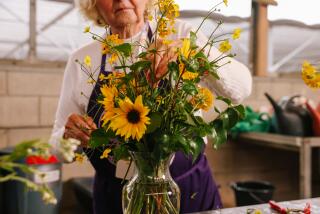APRIL GARDENING SPECIFICS . . .
- Share via
Begin selecting and planting summer blooming bulbs and corms such as gladiolus, tuberous begonias and dahlias.
* As winter annuals begin to die, replace them with spring annuals such as petunias, pelargoniums, dianthus, allysum, phlox, lobelia and impatiens.
* Pinch fuchsias one more time before flower buds appear and begin fertilizing once every two weeks with a balanced fertilizer such as 10-10-5 or 20-20-20.
* Check all new growth and flower buds for aphids and spray as needed.
* As spring bulbs such as tulips and daffodils begin to die down, remove from the ground , let dry for a day or so, remove dead leaves and store in a cold dry place until fall.
Source: Susan Brozowski, Sherman Library and Gardens
. . . AND GENERAL APRIL CARE TIPS * Around Easter, nurseries have a larger selection of flowering plants such as lilies, azaleas and rhododendrons. Try planting them in a semi-shaded and well-drained area in the garden. The spectacular blooms will appear again next year, and serve as a delightful holiday reminder.
* Feed established roses to increase quantity and quality of the blooms.
* For dry spots in the garden, plant some attractive water-wise shrubs such as crape myrtle, oleander, wild lilac and rosemary.
* Use a hand trowel to test how far water is penetrating into lawn soil. Push the trowel deeply into the ground and pull the soil apart. Look for the depth of the roots and the water line in the soil. If it looks damp (not feels damp, but looks damp) near the roots, more water is not needed. If the soil looks dry, water at the normal rate. Allow time for absorption, then pick another spot and check the roots again. Adjust watering rate to dampen the soil just past the root tips.
* If you have a container garden, be sure to monitor its changing watering needs during the increasingly warmer weather. Potted plants tend to dry out faster than those placed in flower beds.
* Garden peas, snap peas and snow peas are easy to grow and a delight for the cook to use in all sorts of dishes.
* Earwigs can run rampant in the garden from late spring until fall if not properly controlled, damaging both fruits and flowers. Chemicals may be applied in damp, shady areas, around and under rocks, near rubbish heaps and even alongside the foundation of your home.
* Be aware that pests and diseases are beginning to awaken from their winter nap in your garden.
Source: California Assn. of Nurserymen






